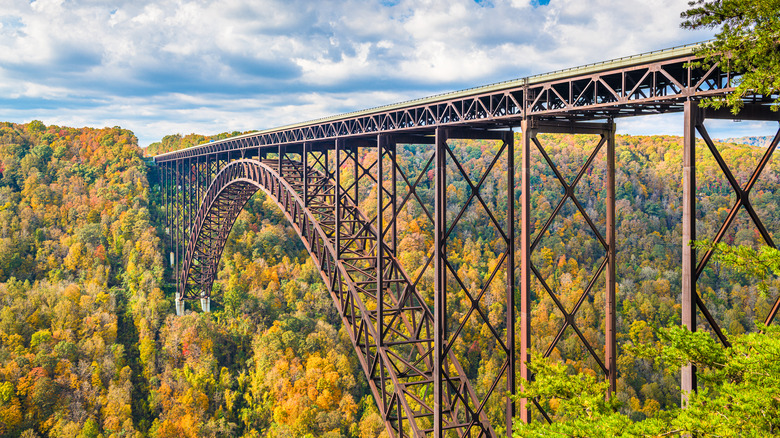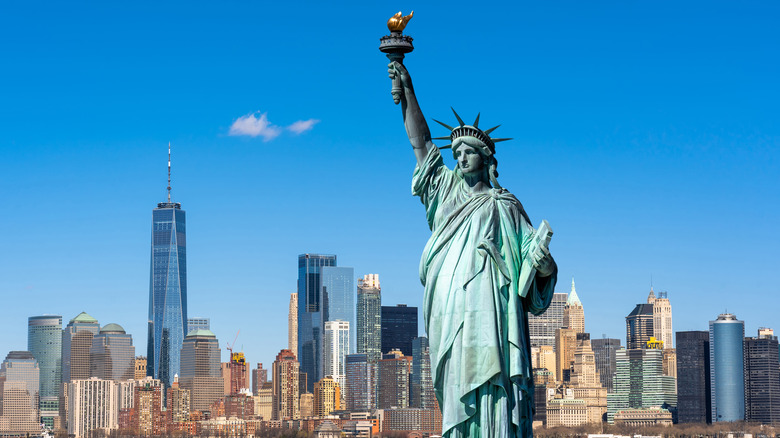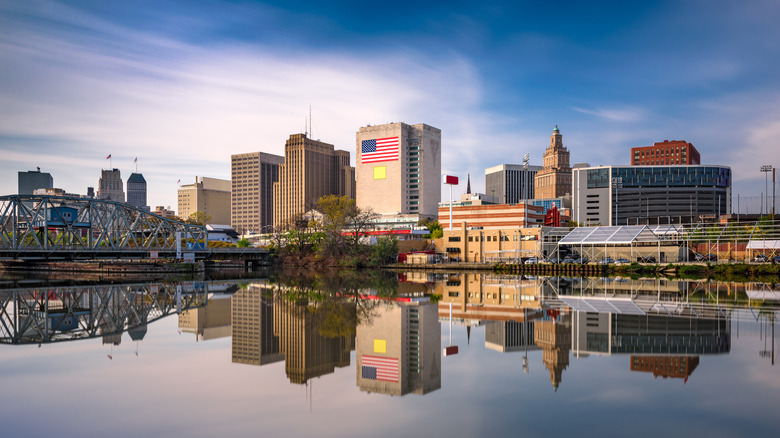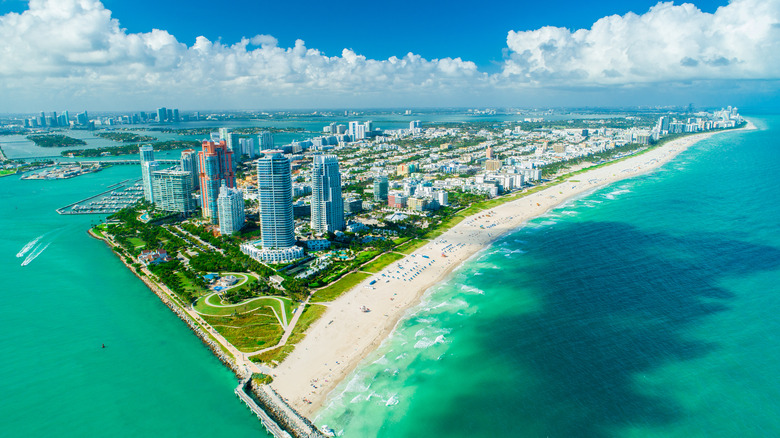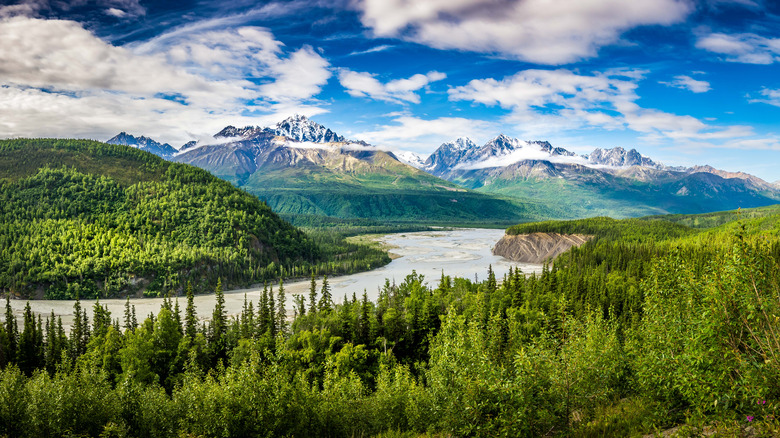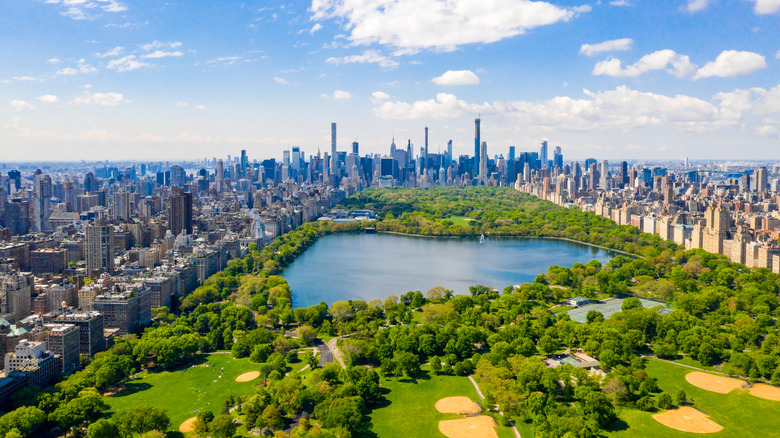Ways The State You Live In Can Affect Your Life Expectancy
It might come as a surprise that despite a pandemic, not-so-favorable premature deaths, and so many more sad statistics, Americans are living longer than ever before. In fact, Americans are sticking around about 30 years longer, on average, than they were a century ago, according to a December 2020 virtual conference by The Longevity Project and the Stanford Center on Longevity (via Palo Alto).
In March 2021, the Centers for Disease Control and Prevention (CDC) released their "National Vital Statistics Report" using data from 2018. According to the report, Americans have an overall life expectancy of 78.7 years. But the same can't be said for Americans in every state. Yes, the state in which you live actually says a whole lot about how long you're expected to live.
A number of state-specific factors — the accessibility of affordable healthcare (or lack thereof), pollution, smoking statistics, and more — affect your longevity. Here are some of the best and worst places to live in America if you're hoping to live a nice long life.
The South has some of the worst life expectancies
Unfortunately, the South has some work to do if the people living down there want to add longevity to the impressive list of things for which the south is known — you know, among sweet tea and warm summer nights.
According to the Centers for Disease Control and Prevention's "National Vital Statistics Report," the bottom 10 states in terms of longevity include Missouri, South Carolina, Arkansas, Oklahoma, Louisiana, Tennessee, Kentucky, Alabama, Mississippi, and West Virginia. Have you noticed that this list is entirely composed of southern states, barring Missouri?
Of these 10, people in Missouri (which isn't in the south!) live the longest at 76.6 years old, on average, followed by people in South Carolina, who live to about 76.5 years old, on average. And West Virginians? The average resident in this state lives for 74.4 years. Although women in West Virginia live for 77.3 years on average, men come in at just 71.7 years.
West Virginians have the country's lowest life expectancy
West Virginians don't have the best prognosis when it comes to living a long life. Compared to the rest of the country, Americans living in the Mountain State have the lowest life expectancy, according to the Centers for Disease Control and Prevention's "National Vital Statistics Report."
Located in the Appalachian Mountains region, the state is known for its unrivaled recreational activities. Residents are spoiled for choice of ways to get outdoors, soak up some sun, get active, and keep healthy. On the flip side, however, the state has the nation's highest rates of drug overdoses, obesity, diabetes, and high blood pressure, according to an Associated Press analysis. It's also known for having the highest suicide rate among the states on the east side of the Mississippi River.
"It seems that the worst outcomes happen here first," Dr. Michael Brumage, a West Virginia University public health expert told the Associated Press. "We're the canary in the coal mine."
Northeasterners have some of the longest life expectancies
Of the top 10 states for longevity, half are in the Northeast. New Yorkers average 80.5 years old, Connecticut 80.4, Massachusetts 80.1, New Jersey 79.8, and Rhode Island 79.8 years old, according to the CDC's "National Vital Statistics Report."
People in these states tend to live longer than Americans in the rest of the country — and that has to do with a variety of factors, from the availability of affordable healthcare to the accessibility of exercise options (read: walking paths, gyms, parks, and more). For example, the small states of Connecticut and Rhode Island also rank in the top 10 states with the most gyms, according to Exercise. For every person in Rhode Island, there are 7.19 gyms. And in Connecticut, there are 7.61 gyms per capita. These folks certainly have their options.
Although New York residents live the longest of all the Northeastern states, there are disparities within. As the New York Post reported in 2017, residents in Manhattan often live a whopping 10 years longer than Brooklyn, South Bronx, and Brownsville residents. This highlights the economic disparity. As Wendy Chavkin, a professor at the Columbia University Mailman School of Public Health, told the Post, "Money opens doors to education, to better housing, to good jobs, and even to health. Those with more money do better on most health outcomes than those with less and so we see people in affluent neighborhoods living longer."
Along the West Coast, people live between 79.4 and 81 years
You know what they say, "West Coast, best coast." Well, that's what people on the West Coast say anyway. And they might be onto something. This region is crushing it when it comes to longevity, per the "National Vital Statistics Report" by the CDC. People who live on the West Coast, which encompasses California, Oregon, and Washington, get to enjoy their side of the country for a long time.
Residents in Oregon, the state ranks number 11 in the country for longevity, live to be 79.7 years old on average. People in Washington, the state that ranks number 7 in the country, average 80 laps around the sun. And Californians are at the coveted number 2 spot. However, California wasn't always near the top of the longevity list.
"Residents of California have significantly improved their lifestyle, improving average life expectancy in the state significantly, and jumping from the 20th position in 1980 to second in 2015," USA Today reported. "The Golden State has the third lowest share of obese adults, the fifth lowest share of adults who do not exercise, and the second lowest share of adults who smoke."
Californians can expect to live into their 80s
Think about how much you'd experience if you spent eight decades on planet earth. Looking at the 1940s to 2021, there was the end of World War II, the Golden Age of television, the civil rights movement, the introduction of the Rubik's Cube, '90s pop, the digital revolution, and so much more. If you really look back, so much has happened — and so much more can happen in the next 80 years.
If you can call yourself a Californian, you might just get to see that for yourself. That's because people in California live to be about 80.8 years old, on average, according to the Centers for Disease Control and Prevention (CDC) "National Vital Statistics Report."
San Francisco also boasts the healthiest city in all of the United States, per a WalletHub report (via The Sacramento Bee). This is mainly thanks to San Francisco coming in at top place for both food and green space.
Consider yourself lucky if you live in a coastal state
What do California, New York, Connecticut, Massachusetts, Washington, New Jersey, and Rhode Island all have in common? They rank within the top 10 list of states with the longest living residents, according to the Centers for Disease Control and Prevention (CDC) "National Vital Statistics Report." Not only that, though, they're all coastal. And, as researchers have reminded us, living by the coast is better for your overall health.
"The coast provides opportunities for experiences that strengthen social support networks and lead to better mental health," environmental psychologist Dr. Lewis Elliott, told Blue Health. He also pointed out environmental factors like better air quality and increased vitamin D absorption.
Even if you can't live in one of these coastal states, you should consider visiting. "I'd never underestimate the importance of holidays and the fact that they can expose you to natural environments that you might not access at other times in the year, it's incredibly important," Dr. Elliot remarked. Of course, he added, "The cumulative effect of actually living by the sea could have a much greater effect in the longer term."
Florida ranks much higher than other Southern states
Florida is often mocked for being a state with a mind of its own. It's got Disney World, Miami Beach, SeaWorld, and, apparently, a whole lot of people who make the news for a whole lot of, uh, strange things. Think: Florida Man.
Florida is also known for its huge population of retirees. In fact, 20% of the state's estimated population of about 21 million people are residents aged 65 and older — a number that is expected to keep climbing, Kiplinger reported. Yes, there are a lot of old folks in the Sunshine State. And they can expect to live a long time, per the Centers for Disease Control and Prevention's "National Vital Statistics Report." The average Floridian's lifetime is 78.9 years. This is much higher than other southern states.
This coastal state boasts a high prevalence of exercise. It also experienced a 21% increase in mental health providers from 2016 to 2020, and a 23% decrease of smokers between 2011 and 2019, according to the United Health Foundation's "America's Health Rankings" report.
Occupational fatalities are a major problem in Alaska
Alaska ranks number 32 of the 50 United States for longevity (via "National Vital Statistics Report"). People there tend to live an average of 78 years. The state is somewhat of an enigma to people who have never experienced it firsthand. To many dreamers, it's nothing but igloos and polar bears. But there's a whole lot more to America's Last Frontier than that. Alaska is home to unparalleled wildlife, famous fjords, gigantic glaciers, lakes, rivers, and so much more.
However, the rate of hypothermia deaths is 10 times higher in Alaska (three per 100,000 people) than it is for the rest of the United States, according to a study published in the journal, Academic Forensic Pathology. However, the risks don't end there. "Occupational fatalities increased 145% between 2012-2014 and 2016-2018 from 4.7 to 11.5 deaths per 100,000 workers," according to the United Health Foundation's "America's Health Rankings" report. And despite its natural beauty, Alaska has the highest prevalence of violent crime (via USA Today).
New Yorkers live a long time, but suicide rates are increasing
New Yorkers live a long time compared to much of the rest of the country, according to the CDC's "National Vital Statistics Report." In fact, it ranks third in the country, with an average of 80.5 years. And according to the United Health Foundation's "America's Health Rankings" report, the state has a relatively low premature death rate.
Contrary to what you might see on the streets of New York City, the state as a whole also has a relatively low cigarette smoking rate. "Food insecurity decreased 26% between 2013-2015 and 2016-2018 from 14.1% to 10.5% of households," the report also confirmed. And although the state ranks in at number 49 for suicide rates, these rates are growing fairly rapidly. According to the United health Foundation's report, "Suicide increased 21% between 2009 and 2018 from 7.2 to 8.7 deaths per 100,000 population."
If you or anyone you know is having suicidal thoughts, please call the National Suicide Prevention Lifeline at 1-800-273-TALK (8255).
Texas fares better than most of the South, but diabetes is a growing issue
Let's talk about Texas. According to the Centers for Disease Control and Prevention's "National Vital Statistics Report," the Lone Star State ranks in at 28th in the country for longevity with an average age of 78.4 years. While the state has a "low prevalence of multiple chronic conditions," according to the United Health Foundation's "America's Health Rankings" report, it has some challenges when it comes to access to affordable health care. Specifically, many people tend to avoid care due to cost. There's also a high uninsured rate.
Couple that with the fact that mental distress has increased 30 percent among Texas adults between 2014 and 2019, and it's not a good combination. Diabetes is also on the rise in Texas. It's increased 20% between 2011 and 2019, "from 10.2% to 12.2% among adults," per the report. According to 2019 data, Texas ranks in at number 12 for states with the highest prevalence in diabetes (via State of Childhood Obesity).
Wyoming ranks fairly low on the longevity list
Wyoming ranks 30th in the country in terms of how long its residents live, with an average age of 78.1 years old, according to the Centers for Disease Control and Prevention's "National Vital Statistics Report." Part of the reason people die early isn't all due to natural causes, however. Wyoming, sadly, had the highest suicide mortality rate in the country, according to the CDC. By 2019, the state was reportedly bumped by Montana, but remains high (via Jackson Hole News & Guide). In fact, according to the United Health Foundation's "America's Health Rankings" report, Wyoming's suicide rate is 25.8, while New Jersey's is 8.6 (this is the lowest rate in the country). Wyoming's suicide rate is even higher than the national average, which has increased 25.4% from 1999 to 2016.
Both Wyoming and Montana also have "higher rates of gun ownership" than many other states, as well as "weak gun violence prevention laws," according to Jackson Hole News & Guide. "The VPC [Violence Policy Center] defined states with 'weak' gun violence prevention laws as those that add little or nothing to federal law and have permissive laws governing the open or concealed carrying of firearms in public," the VPC explained.
If you or anyone you know is having suicidal thoughts, please call the National Suicide Prevention Lifeline at 1-800-273-TALK (8255).
This is why the North tends to be healthier than the South
The north tends to be a lot healthier than the south for a whole host of reasons. According to the Centers for Disease Control and Prevention's "National Vital Statistics Report," most of the longest-living people come from the northern bits of the United States. And, that's due to a number of reasons, including smoking bans, walkability, access to care, and more, according to Texas A&M Today.
Specifically, of the 26 states across that country that have statewide indoor air smoking bans in place, none are in the south, according to the American Nonsmokers' Rights Foundation. Also according to the website WalkScore, which rated 141 cities across the United States on how easy it is to walk from point A to point B, the majority of the country's most walkable cities are in the north. With factors like these at play, it makes sense, then, that people in the north tend to live longer than people who call the southern states home.
Western and Middle America live a long time
State in the west and Middle America fair pretty well when it comes to longevity, per the Centers for Disease Control and Prevention's "National Vital Statistics Report." California ranks number 2 for resident longevity and Minnesota isn't far behind at number 4. These findings correspond with a map published in a study in the Journal of Personality and Social Psychology, which breaks the country up into three distinct psychological regions based on a whole bunch of empirical data.
The study calls the West Coast states of Washington, Oregon, and California the "relaxed and creative" region marked by "low extraversion and agreeableness, very low neuroticism, and very high openness," according to a 2013 review published by The Atlantic. The area is full of cultural diversity, and it's richer, better-educated, and more innovative than the other areas. The study also dubs Middle America the "friendly and conventional" region. It's known for its high levels of "extraversion, agreeableness, and conscientiousness." It makes sense that these two regions live a long time.
Hawaii boasts the longest life expectancy of any state
It may not shock you to learn that Hawaii is ranked the healthiest state of all the United States. According to the Centers for Disease Control and Prevention's "National Vital Statistics Report," Hawaiians live to be 81 years old, on average.
Researchers have long purported that spending time outdoors is great for your mental and physical health. Research published in Urban Forestry & Urban Greening suggests that living in green environments is linked to better mental health and lower all-cause mortality, after all. A burgeoning body of research also shows that living near water "lowers stress and anxiety, increasing an overall sense of well-being and happiness, a lower heart and breathing rate, and safe, better workouts," biologist and author of Blue Mind, Dr. Wallace J. Nichols, confirmed to People.
It makes sense that Hawaiians would fare best in terms of living long, healthy lives. Hawaiians are blessed with green and blue nature all around.



